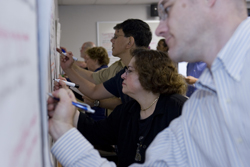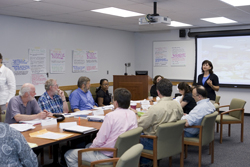First Provost's Teaching Academy raises the bar
|
“It’s my first day back at school,” said Shohreh Amini, a biology professor in the College of Science and Technology. And while there’s nothing unusual about the 2009 Lindback Award winner being in the classroom, this time she’s there as a student, rather than a professor. The “Teaching in Higher Education” seminar the selected faculty will teach is part of a newly approved certificate being implemented through Temple’s Teaching and Learning Center (TLC) and awarded by the College of Education. |
 Photos by Joseph V. Labolito/Temple University
In an interactive exercise about “Aligning Learning Objectives with Assignments,” participants in the Provost’s Teaching Academy post learning goals for the courses they teach. From left are faculty members Dan Kern, theater; Jean Boyer, educational psychology; Justin Yi, computer information systems; Shohreh Amini, biology; and Alistair Howard, political science. |
|
“We already have a great faculty,” said Staiano-Coico. “Now we can learn and improve and be even better by advancing both teaching and learning outcomes and Temple’s competitiveness." |
|
 Pamela Barnett, associate vice provost and director of the Teaching and Learning Center, leads faculty participants in the first Provost’s Teaching Academy in a discussion about different types of learning goals. |
“Graduate students teach 25 percent of our courses (in some capacity),” said Barnett. “Now, we’re bringing them research-based methods that are best practices. We’ll be preparing approximately 20 faculty members a year, and each will prepare 20 students a year. More universities will want Temple-trained teachers." Overall, the certificate program and the Provost’s Teaching Academy will not only enhance the teaching expertise of faculty, but also will create an incubator for best teaching practices and new ideas. “It’s an opportunity for a small group to raise some questions and start a dialogue that will go up; an opportunity not just to come together, but to come up with ideas,” said Rickie Sanders, a professor of geography and urban studies who is part of the first cohort. |
|
|
|